- Home
- Donald McCaig
Jacob's Ladder Page 4
Jacob's Ladder Read online
Page 4
Duncan, who was not a regular shaver, nodded.
“Only a fool can mistake that murderous yankee steel. Recently I had despaired of secession’s prospects, but Mr. John Brown has made me glad. Now, sir . . .” And with that, as if he’d given himself leave, the old man darted up the thirteen steps onto the gallows platform overhead.
Thumb hooked around the hammer of his musket, Duncan followed. On each stair the old man’s footsteps had scuffed frost.
Edmund Ruffin stood at the rectangular trap, boot toes at the crack. He said, “Don’t fret, son. For the certainty of heaven I wouldn’t disturb these arrangements.” When he turned, his eyes were wide as a child’s. “You ever consider how it feels?” Unerringly his left hand located the overhead beam, the hook over which they’d pass the rope; he gave the hook a jolly tug. “Imagine such a thing. Everything you’ve done in your life, all the wonders you’ve seen, why, the very way you clasp your pen or button your britches, all come together here.” He stamped. “And after they mumble a few hypocritical prayers, ohhhh . . .” His free hand gripped his throat and his tongue spurted out, dark as blood, and his head canted to the side.
Duncan backed from Ruffin’s mime, and the old man returned to life. “You ever wonder what remains of us, son?” He jutted his jaw toward the jail. “I imagine yonder fellow has some acute thoughts on the subject.”
“Don’t!”
But it was done. The old man had hopped on the trap. He flexed his legs, trying the hinges and bolts that held it fast. “Ahh,” he said.
The commons below were washed by the moon and the picket fires high on the Blue Ridge were diamonds forming the limits of the known world. “ ‘I do not wish your comfort,’ ” he said in a voice not his own. “ ‘I die in my faith.’ A queen said that, son. How about ‘It is a far, far better thing I do now than I have ever done’?” Ruffin spat. “Mr. Dickens vilified us after his American tour. We in the South were not nice enough for him. Uncommonly fastidious, Mr. Dickens, for a scribbler. Should he return to Richmond, I believe he would find the climate disagreeable. Step up here, boy. Go ahead. Standing on a gallows trap will flush the cobwebs from your brain.”
Duncan stepped beside the older man.
“There now, doesn’t that make you want to produce an oration?”
Dry-mouthed, Duncan shook his head.
“Look out there: two thousand men gathered in your honor. Not many deathbeds, I think, boast such a show of martial ardor. The Brigade of Cadets, the Virginia Grays, United States troops under Colonel Lee. Oh, we think high of you, boy. What have you to say for yourself?”
Duncan’s head shook no, no, in dumbshow.
“I ask you, sir: why did you wish to arm our servants against us? Why did you conspire to murder our families in their beds? Why did you invade a sovereign state to such bloody and terrible purposes?”
Duncan blurted, “I’m not him.”
With a sweep of his hand, Ruffin dismissed the waiting troops, the dignitaries. “You’ve no imagination. And we ask why the South has no profession of letters. Do you think he’ll falter, son? Refuse the noose?”
Duncan eased off the trap as if it were hair-triggered. “Just who the dickens are you?”
“Edmund Ruffin, agriculturalist, editor. Present occupation: firebrand.”
Duncan said who he was: “From Stratford Plantation, south of here. We come here by train, the Brigade of Cadets, first time I was ever on one of the stinkers and it like to made me sick, the cinders and smoke and swayin’ from side to side . . .”
The ancient cadet wasn’t listening. “I believe our John has come too far to show the white feather. If his life has been precious to him, none of his previous adventures have proved it so. Mr. John Brown will wear his noose like a riband of honor. Sometimes courage is easy. Have you ever seen the moon so near to the earth? What do you fear, Duncan Gatewood?”
It was getting on toward three and Duncan had been on duty since midnight. He would have scant sleep before morning muster, and the hanging was scheduled for nine. “The loss of honor,” Duncan said, and it was true what he said despite its nearness to his tongue. If the old man had pressed him, Cadet Gatewood might have admitted that he preferred honor to love, to country, to, even, the safety of his own soul. Such preferences were not too rare in the Cadet Brigade. Many a young man will go to the devil gladly if honor’s intact.
“This will be a tale to tell your grandchildren . . .” Ruffin began.
Annoyed by Ruffin’s probe, which had taken unfair advantage—Duncan thought—of the natural respect accruing to his gray locks, Duncan asked, “And you, sir; what do you fear?”
Ruffin was silent.
“It’s only fair, sir, that you answer as I answered.”
Ruffin’s sharp eyes weighed the young man. “One day, Cadet, you will say you were here where it began, you were present at the birthplace of a new republic.”
“Your fear, sir.”
“When Andrew Jackson fought Lawyer Dickerson, allowed his foe the first shot, suffered his wound and then coolly shot and killed his man, honor was satisifed. Honor can be satisfied by a pistol ball, a rapier thrust. The loss of honor, sir—and I intend no disrespect—is a young man’s fear. We old men fear falling upon the mercy of others.”
The moon slipped behind a cloud and darkness chased the sparkle from the dead grass. In the jail behind the gallows, the condemned man’s lantern gleamed, unwavering as a star.
JUMPING THE BROOMSTICK
STRATFORD PLANTATION, VIRGINIA
JUNE 17, 1860
Until death or distance us do part.
—Slave marriage vow
“IT WON’T BRING five bushels.” Samuel Gatewood crushed the wheathead in his hand. “Last week’s storms lodged and ruined it. This Mediterranean wheat may defy Hessian fly but I believe it produces a weaker stand.”
Uther Botkin (who knew nothing about wheat) crushed a wheathead and was rewarded by chaff fluttering onto his pantlegs. Old Uther’s black suit served him equally for occasions of celebration and mourning. An oversized, old-fashioned silk foulard drooped across his shirtfront. “Surely,” he said, “if one man can pluck the wheat upright again, another can scythe it.”
“A slow process, my friend. And the rain will have stripped the stalks. Flour is bringing record prices in Richmond. Those unpropitious thunderstorms may well have cost me a hundred dollars.”
“So much? Goodness. I had no idea.”
Stratford’s prime bottomland stretched out at their feet. Jack the Driver’s gang was hoeing corn. Two women switched milk cows into the woods to graze. Behind the big barn, a servant was emptying the slops barrel into the hog pen.
“I never tire of looking at it,” Samuel said. “Excepting my years at Washington College, I’ve never been away for more than the two weeks I visited my wife’s family home in Chesterfield County.” He smiled. “They were two painfully long weeks. My Abigail’s kinfolk were unimpressed by a crude backcountry planter. Excepting dear Cousin Molly, my wife’s family have never visited Stratford.”
“If Mahomet cannot go to the mountain, the mountain must come to Mahomet,” Uther said happily.
“You have received a letter from your daughter, Sallie,” Samuel Gatewood speculated.
“I have indeed.” The old man’s pleasure was extreme and even a little comical. “I have boasted, neighbor, of my Sallie’s good fortune securing admission to Augusta Female Seminary. I should say, sir, I believe your kind intercession with Dr. Timberlake weighed strongly in Sallie’s favor. Of a hundred thirty girls, my Sallie is one of three scholarship students. I had worried she would be restricted to the ‘womanly’ arts: decorum, music, a little French. But the Seminary, Sallie writes, boasts a Latinist who has taken an interest in her. My Sallie quotes Cicero! Two quotations in a single letter! Oh, I am beside myself!” Uther loosed his reins, fluttered his hands. Luckily the antique beast he was astride was indifferent to his rider’s behavior. “But I forget my manne
rs. What news have you of Duncan? I do not know that your son is the cleverest boy I ever taught, but he is blessed with frankness and generosity and uncommon grace. Nature has been kind to him.”
“Duncan does not understand where his interests lie,” Samuel said roughly. His big roan shifted his feet and Samuel jerked the bit, and it was a moment before the horse settled again. Samuel said, “You will have heard of Duncan’s grandfather, Thomas Gatewood.”
The most venerable local scandals reliably produced headshaking at every hearth in the county. Uther’s silence was as close to a polite lie as the old schoolmaster could manage.
“Like my son, sir, my father loved ladies. I turned a blind eye to his transgressions until, on an occasion when my mother was away visiting her people, my father installed his slut from the Quarters in my mother’s bedchamber. When I remonstrated, he spoke to me as no gentlemen speaks to another.”
“Samuel, perhaps . . .”
Samuel Gatewood’s eyes wandered over his plantation. “I departed for Washington College and did not return here until my father’s funeral. Once he was buried, that very afternoon, I purged the Quarters of my father’s mistresses. You are a learned man, my friend. Do you think these vices follow the blood, recurring again and again, skipping one hopeful generation only to manifest themselves in the next? Duncan . . . is my Duncan beyond hope?”
“Samuel, I . . .” Uther took breath to give the matter thought. “Sir, I cannot believe in such inheritances, dreadful or benign. Like Mr. Jefferson, I believe reason the grandest of our faculties. Reason is available to every intellect.”
Samuel Gatewood shifted in his saddle and wouldn’t meet his neighbor’s eye. He twined his reins. “Our neighbors expected me to challenge the cuckold who shot my father. But why should I duel someone for resenting acts I despised myself?”
With nothing to say, old Uther was wise enough to say nothing.
Jack the Driver had concluded the hoeing and dismissed the hands, who hurried toward the Quarters to prepare for the celebration. Samuel said, “How they enjoy an occasion. How they love to dress in their Sunday best. They are children, my friend.”
Old Uther shook his head. “Jesse is no child. Had he been born white, any man would be glad to claim his acquaintance. We are mistaken about our coloreds, Samuel: if the abolitionists exaggerate their accomplishments, we diminish them. Had it not been Jesse’s express wish, oft repeated, I should never have sold him to Stratford. But poor Jesse is as smitten with Midge as I was with my own dear wife.”
“Neighbor, I wish you had accepted a fair price for the boy. Ten dollars!”
“A sop to my conscience, sir. And I am in your debt for many kindnesses. Samuel, you promise Midge has consented?”
“She is young. She will learn to care for Jesse in time, and, in any event, they are of my family now, Uther, and you must trust me to do what is best for them.”
“I suppose . . .” Uther began cheerfully, but subsided to a quieter note. “We all do what we can.”
“My wife is partial to Midge and plans a nuptial feast in our dining room. It is Abigail’s fancy, and I can’t see how it can do harm. The couple, Jack the Driver, Abigail, myself, and you, when you join us, my friend, we will create a happy occasion.”
The rap at the door was Sister Kate’s diffident appeal. When Abigail removed the cloth from her eyes and sat upright, a bolt of pain shot to her forehead. “Yes?”
Sister(-in-law) Kate peeped around the door, her watery eyes bulging like the eyes of an aging feist dog.
Kate Gatewood had been fifteen when her father was killed, just a child really. Her mother’s acolyte from that day forward, she had never known a man.
“I come seeking counsel, sister,” Kate Gatewood said in her thin, cheerful voice. In the winter months Sister Kate spent her days indoors with Grandmother Gatewood. In warmer weather she tended the garden and seemed healthier. She inspected Abigail anxiously. “Sister, are you well?” Worry lines pinched Sister Kate’s forehead. “Poor dear. You shoulder so many burdens.”
“No more than I ought,” Abigail replied dryly. “I was lying down. These headaches rack me terribly.” Abigail poured fresh water into the broad porcelain bowl and dabbed at her cheeks. What would she do without Midge? Midge had begged to retain her position, but her baby was already showing and mistress and servant alike must acknowledge that Midge was a grown woman whose proper place was in the Quarters with others of her race.
Though Samuel had never berated her, all this unpleasantness was Abigail’s fault. Why had she indulged the child? Why had she made a colored servant her confidante?
Two decades ago when she met Samuel, Abigail had been summering in Lexington, Virginia, with distant kin. Since a throng of wellborn, unattached young men attended college in that town, handsome girls like Abigail were courted to distraction. “Do come to the ball, dear Abigail,” and “Do ride out with me along the canal.”
Abigail had judged herself fickle and too proud until she met Samuel Gatewood. She never afterward looked at another man, and the day Samuel came into his competency, he proposed.
She had loved Samuel—loved him still—though they had not shared a bed since the twins . . . she dared not think of the twins. The palms of Abigail’s hands tingled remembering how the skin had slipped off her dear baby’s face. She dared not remember the twins. She would make a pleasant ceremony for Midge and Jesse, and in time, all things would be forgotten.
“I fear Grandmother Gatewood is dissatisfied with our plans for Midge’s levee, sister. She opposes our nicer touches.”
Abigail thought to say, “It is a near certainty Grandmother will be dissatisfied.” But as ten thousand times before, Abigail held her tongue. “Oh,” she said. “That is too bad.”
Kate looked doubtful.
“I mean to do what I can to make this day as agreeable as circumstances allow. Midge is a confused child. One minute she intends to marry within her race, the next she expresses the most unsuitable ambitions. Jesse dotes on her. The other evening, after day’s work was done, I surprised him waiting at the kitchen-house door with a bouquet of wildflowers. Jesse has a way about him, a strength, that will tame Midge’s excesses.”
“Would you please come to the dining room, sister?” Kate asked. “Grandmother Gatewood is in one of her humors.”
Midge and Jesse would be married on Stratford’s front porch, Samuel Gatewood officiating. Samuel asked Jesse if he wouldn’t rather be married by Preacher Todd, but Jesse said no, they’d just jump the broomstick in front of the master like the other coloreds did. He said Midge would come to love him and he’d care for her and her baby. He said he’d care for her baby as his own.
Grandmother Gatewood was laying out the cheap tinware they brought to the fields for the harvest gangs.
Abigail did not quite sigh. “Good morning, Grandmother. I trust this weather is agreeing with you.”
The older woman looked her reply. Scarlet fever had taken her three youngest children and a babe in arms. John Dinwiddie’s .58-caliber ball had taken her unfaithful husband. After her husband’s death, she never left Stratford except for worship at SunRise Chapel. After services, while other parishioners exchanged the week’s gossip, Grandmother Gatewood and Sister Kate waited in the carriage, side curtains drawn. Grandmother Gatewood had worn pride like a mask for so many years the mask had become her face.
“Samuel intends Midge’s wedding feast to be uncommonly nice,” Abigail said. “Jesse is a valuable hand, and Midge is dear to me.”
Mother Gatewood’s knowing glance meant, “Not so dear to Jesse as to your son, Duncan,” and Abigail flushed to the roots of her hair.
“It was Samuel’s express wish this wedding be dignified,” Abigail said.
Grandmother Gatewood went to the sideboard for a basket of tin forks and spoons. She upended the basket in the center of the table, meaning, “This is the dignity they deserve.”
“Grandmother, although our best china and silve
r were your dowry, surely we must respect Samuel’s wishes.”
Grandmother Gatewood’s satisfied smirk meant, “He may be master of Stratford Plantation but he is still my son.”
“Perhaps we could use the better candlesticks,” Sister Kate whispered. “They are too large to steal.”
Grandmother Gatewood’s sly grin meant, “Niggers can steal anything!”
“Grandmother, I shall have to speak with Samuel!” Abigail said.
When she closed Samuel’s study door behind her, her hands were shaking. Why was malice so powerful? Samuel was an honorable man trying to guide his family. Why was he thwarted?
Her husband’s room was spartan: desk, pine wardrobe, camp bed—perhaps the same sort of bed Duncan had at the Military Institute. Although every servant coming into the house passed through this room, Samuel made his own bed, swept his own bare floors, and carried his own firewood.
His modest library lined one wall, and agricultural periodicals lay on the commode beside the bed. Abigail adjusted them, tenderly. She would go to the Quarters to fetch Midge. What more can we do than our duty?
When Samuel Gatewood came into the kitchen house, Rufus was perched on the cook’s table. Rufus chewed fast and swallowed hard. “Cook give me this stale cornbread before it go to the hogs. I come in here for the broomstick, Master. Me and Jack gonna hold the broomstick for Jesse and Midge jump over. They got to hop right smart if their marriage be lucky. Yes, sir, me and Jack, we make ’em hop.”
When Rufus was in the woods with his gang of timber cutters, he was a first-rate hand. Up close, he was an irritant. Samuel said, “In the meantime, perhaps you’ll take this tea to Master Uther in the parlor.”
In his study Samuel washed his face and hands and combed his hair. He tied a pale blue neck scarf. “Come in,” he said, and Jack the Driver entered the room where, every morning, he received the day’s instructions.
Jack’s forehead shone with perspiration. “Master, I been asked to talk to you.”
“Take a chair, Jack. We needn’t stand on ceremony today.”

 Eminent Dogs, Dangerous Men: Searching Through Scotland for a Border Collie
Eminent Dogs, Dangerous Men: Searching Through Scotland for a Border Collie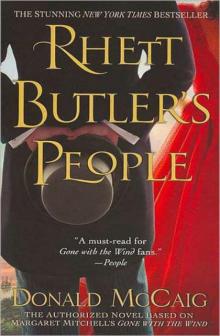 Rhett Butler's People
Rhett Butler's People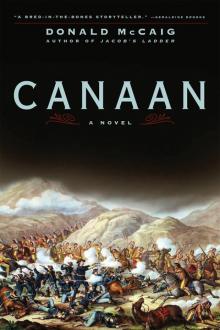 Canaan
Canaan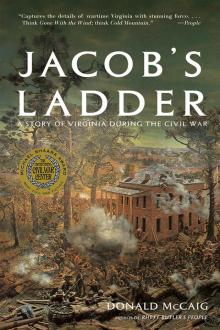 Jacob's Ladder: A Story of Virginia During the War
Jacob's Ladder: A Story of Virginia During the War Nop's Hope
Nop's Hope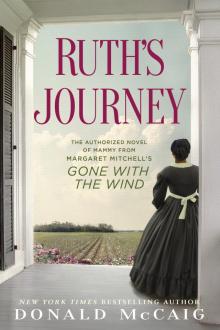 Ruth's Journey: The Authorized Novel of Mammy From Margaret Mitchell's Gone With the Wind
Ruth's Journey: The Authorized Novel of Mammy From Margaret Mitchell's Gone With the Wind Nop's Trials
Nop's Trials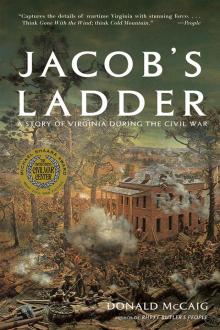 Jacob's Ladder
Jacob's Ladder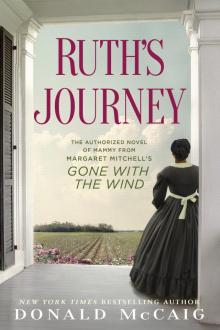 Ruth’s Journey
Ruth’s Journey Eminent Dogs, Dangerous Men
Eminent Dogs, Dangerous Men